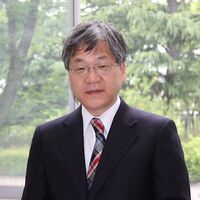Karashima, S.: Difference between revisions
No edit summary |
m (Text replacement - "{{Footer}}" to "") |
||
| (One intermediate revision by one other user not shown) | |||
| Line 29: | Line 29: | ||
|classification=People | |classification=People | ||
}} | }} | ||
Latest revision as of 14:38, 5 June 2024
| PersonType | Category:Authors of English Works Category:Professors |
|---|---|
| FirstName / namefirst | Seishi |
| LastName / namelast | Karashima |
| MainNamePhon | Seishi Karashima |
| SortName | Karashima, Seishi |
| bio | Professor Seishi Karashima was appointed assistant professor at Soka University’s International Research Institute for Advanced Buddhology in April 1997 upon the establishment of the institute, becoming a full professor two years later. After taking on the role of director in April 2011, he continued to make significant contributions to the development of the institute. Specializing in Buddhist philosophy, Professor Karashima applied his vast knowledge of Sanskrit, Tibetan, Pāḷi, Middle Indo-Aryan, and ancient Chinese to conduct detailed analyses of early Chinese Buddhist Translations. Among his many publications, he compiled A glossary of Dharmaraksa's translation of the Lotus Sutra, A Glossary of Kumārajīva's translation of the Lotus Sutra, and A glossary of Lokakṣema's translation of the Aṣṭasāhasrikā Prajñāpāramitā. He studied the formation of early Mahayana Buddhism and was a leading light of the Buddhist academic community in Japan and abroad. Professor Karashima was invited to work at various institutions in Japan and abroad, including the University of California, Berkeley; the School of Literary Studies at Renmin University of China; and Institut de France. During his time at these institutions, he did not limit himself to simply giving lectures on Buddhist studies. He also set up initiatives to support research, such as creating a worldwide network of Buddhist researchers. Numerous published papers and books bear the hand of Professor Karashima, either as author or editor. These include Vessantara-jātaka Yakuchū (included in The Jātaka, Vol. 10 by Hajime Nakamura, Shunjūsha, 1988); A Textual Study of the Chinese Versions of the Saddharmapuṇḍarīkasūtra (Sankibo Busshorin, 1992); A Study of the Underlying Language of the Chinese Translation of the Dīrgha-āgama (Hirakawa Shuppan Inc., 1994); Buddhist Manuscripts from Central Asia: The British Library Sanskrit Fragments, (author and editor of three volumes in five books; International Research Institute for Advanced Buddhology, Soka University, 2006, 2009, 2015); Abhisamācārika- Dharma (three volumes, German language publication, International Research Institute for Advanced Buddhology, 2012); Languages and Transmission of Buddhist Scriptures (Chinese language publication, Nakanishi Shokyoku, 2016). (Source: Soka University) |
| YearBirth | 1957 |
| YearDeath | 2019/07/23 |
| affiliation | The International Research Institute for Advanced Buddhology, Soka University, Tokyo |
| StudentOf | Dr. Ji Xianlin (季羡林, 1911–2009) |
| phduniversity | Beijing University |
| education | B.A. and M.A., University of Tokyo
Ph.D. Beijing University
(Also studied at Cambridge University and at Freiburg University) |
| IsInGyatsa | No |
| Other wikis |
If the page does not yet exist on the remote wiki, you can paste the tag |

